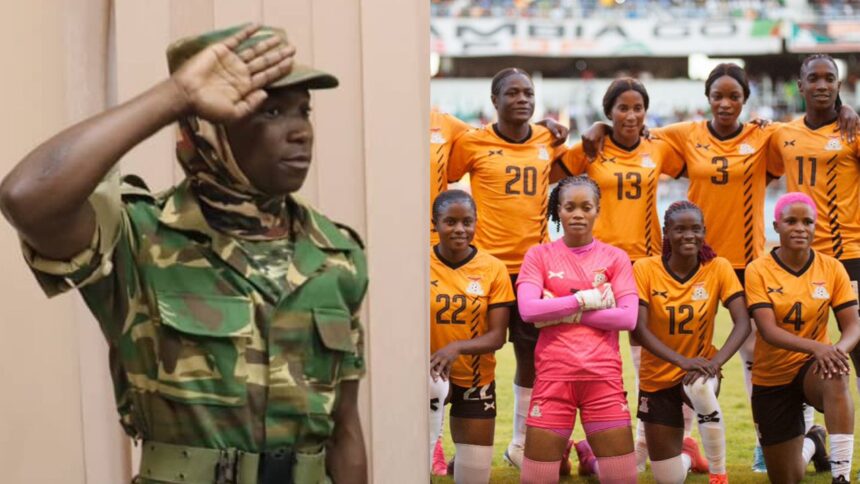Two months ago, three of the Copper Queens’ first-team players were recruited into the Zambia Air Force. The trio, which is currently undergoing military training, includes Magret Belemu, Ochumba Oseke, and Mary Wilombe.
As a result, they will miss the Olympic Games qualifiers in February, as was the case with the just concluded 2024 Women’s Africa Cup of Nations (WAFCON) qualification round.
However, the three are not the first ones to join the military; midfielder Susan Banda is a soldier in the Zambia Air Force, while captain Barbra Banda and defender Agness Musesa are Army sergeants.
Ireen Lungu is also a corporal in the Army, while defenders Martha Tembo and Lushomo Mweemba are Lance Corporals.
The Zambia women’s team is arguably one of Africa’s most promising. They were the continent’s sole representative at the 2020 Tokyo Olympics and finished third at the 2022 WAFCON.
The Copper Queens also participated in the 2023 FIFA Women’s World Cup in 2023, finishing third in the group stage behind Japan and eventual winners Spain. They have been on the rise ever since, beating Angola back-to-back to qualify for next year’s WAFCON.
Despite the recent successes of the team, the majority of the players are not well-paid at their respective local clubs.
In a world where football has become lucrative, some Zambian female footballers receive almost nothing.
Zambia’s Women’s League is not well-paying
BolaNews understands that some players in the Zambian Women’s League are paid as little as K500 ($20) per month. As a result, the vast majority of them have sought employment in the Army and Air Force.
Zambian women’s football writer Aaron Mulbanga believes the players are choosing the military for financial stability.
“The reason why players chose military teams is because it gives them income stability. Women’s football does not get the same funding as men’s football, and most of the teams are run by individuals who just have a passion for it and may not have the resources; hence, players get paid peanuts or nothing at all,” he said.
The Zambia Air Force and Army own Zambia’s most prominent women’s clubs, the Red Arrows and the Green Buffaloes. It is now almost every female player’s dream in the country to join those two clubs and stand a chance of being recruited into the military.
Women’s football in Zambia has improved significantly at the international level, but the same cannot be said for club football.
The majority of the national team players are from low-income families and not earning enough in the domestic league.
In 2021, the Football Association of Zambia (FAZ) launched the Women’s Super League, which has resulted in an increase in the number of women’s clubs across the country, some of which are run by individuals.
The league is solely sponsored by FAZ and is experiencing financial difficulties.
Against all odds, it has produced over seven players who now play professional football outside of Zambia in the last two years.
This route has also altered the lives of some international players, with the top earners, who play abroad earning an estimated $5,000 (K121,390) per month.
This has given hope to many young girls in the country who are dreaming of making it abroad.
READ ALSO: Chawinga voted Player of the Year in Italy but she is disappointed with her country
Meanwhile, the FAZ president, Andrew Kamanga, said, “I wish to appeal to our partners in the corporate world to support women’s football.” This call has been constantly echoed by stakeholders in the women’s game.
Mubanga thinks “the potential of women’s football is yet to be realised” in Zambia.
He added, “The Copper Queens qualified for the World Cup, and yet the league where the majority of these players come from still has no sponsor? Mind-boggling right?
“The corporate world needs to come on board and help elevate women’s football to the next level.”
